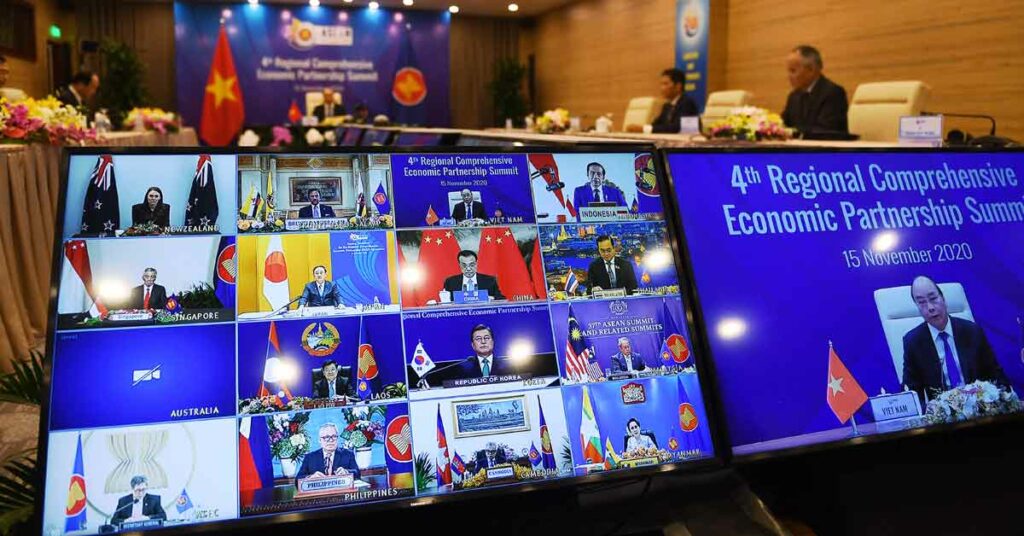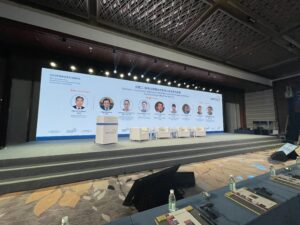
On 1 January 2022, the world’s largest trade deal, the Regional Comprehensive Economic Partnership (RCEP), came into force.
RCEP is a trade agreement involving the 10- member states of the Association of Southeast Asian Nations (ASEAN) and their largest free trade agreement (FTA) partners, namely China, South Korea, Japan, Australia, and New Zealand. The said trade pact covers trade in goods and services, intellectual property, etc.
Based on reports and studies, RCEP covers a market of around 2.2 billion people, which is about 30 percent of the world’s population, more or less US$26.2 trillion worth of global output, approximately 29 percent of the global gross domestic product (GDP), 27 percent of global trade, and 29 percent of global foreign direct investment (FDI).
RCEP thus far is larger than other regional trading blocs, even larger than the European Union (EU). Analysts envisage that members of RCEP, in the long run, will benefit much from it.
Among the first countries in ASEAN that have ratified RCEP are Brunei, Cambodia, Lao PDR, Singapore, Thailand, and Vietnam. Four non-ASEAN countries have also ratified RCEP as early as November 2021 – Australia, New Zealand, China, and Japan.
South Korea ratified RCEP in December 2021, and the trade agreement is expected to take effect in South Korea this February. ASEAN countries that have not yet ratified RCEP include Malaysia, Indonesia, Myanmar, and the Philippines.
Channel News Asia reported on October 2021 that Malaysia is amending its 1983 Patents Act, 1987 Copyright Act, and 2019 Trademarks Act to ratify RCEP. According to Malaysian Deputy International Trade and Industry Minister Lim Ban Hong, “to complete the RCEP ratification process, these Acts need to be amended. These amendments are necessary to ensure that they align with Malaysia’s obligations and commitments under the RCEP agreement.
Indonesia will accordingly ratify RCEP in the first quarter of 2022. Chief economic minister Airlangga Hartarto said that the parliamentary commission overseeing trade rules had approved the ratification. Its endorsement will be brought to a broader parliamentary vote in the first quarter of 2022.
Myanmar sent its instrument of ratification to the ASEAN secretariat around September 2021. Though Myanmar is part and parcel of RCEP, given the country’s volatile political situation, ASEAN member-states have yet to decide on this matter. They are also closely monitoring the political situation in Myanmar.
Despite the Department of Trade and Industry (DTI) and other government agencies engaged in the negotiations of RCEP and some economic think-tanks in the country calling Senators to ratify RCEP before its implementation, the Philippines still failed to ratify RCEP as the Senate went into recess without approving the ratification.
Based on some reports, RCEP faces opposition and resistance from several non-governmental organizations (NGOs), primarily agriculture-based groups, who have been asking members of the Philippine Senate to abandon the trade pact.
In the advent of the May 2022 election, which is fast approaching, it seems that the ratification of RCEP in the Philippines is still in limbo.
Importance Of RCEP
According to House of Representative Deputy Speaker Hon. Rodante Marcoleta of SAGIP Party-List, the Philippines missed the 1 January, 2022 effectivity date of RCEP as the Senate went on recess without concurring the ratification of the trade deal initiated by President Rodrigo Duterte on 2 September, 2021.
Marcoleta who is running for senator in the May 2022 elections further said that the RCEP treaty would have given the country a bigger export market and opportunities for foreign investments. Some of the specific benefits, according to Marcoleta include; (1) securing market access for cheaper raw materials and intermediate goods for export and local industries; (2) Philippine exports can avail of flexible certification procedures that will help Micro, Small, and Medium Enterprises (MSMEs), especially agricultural producers, to avail of preferential arrangement with free trade arrangement (FTA) partners; and (3) with RCEP, real GDP growth could increase by 0.9 percent with poverty declining by five percent in 2030.
Marcoleta reiterated that delayed entry or failure of the Philippines to ratify RCEP would result in the loss of massive economic benefits. RCEP, according to Marcoleta, could potentially account for 30 percent of world trade, 30 percent of world GDP, and 47 percent of global outward FDI in the region’s economy of 2.3 billion people.
In an online webinar hosted by Manila Times, one of the longest-running and well-respected broadsheets in the Philippines, with the theme, “China-ASEAN Relations: Realizing RCEP’s Potential,” held on 15 September, 2021, Dr Henry Lim Bon Liong, President of the Federation of Filipino-Chinese Chamber of Commerce and Industry, Inc. (FFCCCII) said that RCEP is important to the Philippines as it accounts for about 50 percent of Philippine exports and 68 percent of Philippine import sources. Therefore, the Philippines would benefit from the emergence of RCEP in terms of increased trade and investments.
Dr Henry Lim also elucidated that matters related to the COVID-19 pandemic and pandemic response are areas where the Philippines and fellow RCEP countries, especially ASEAN member states and China, can strengthen cooperation in strategically important and economically vital areas of public health, research and development of vaccines and other medical products.
According to him, ASEAN and China can work together to enhance medical and health industries not only for the two regions but also for exports to the world. He also explained that one of the reasons for the paramount importance of RCEP is the leadership of China and its willingness to be part of the free trade agreement.
“With China’s growing global economic influence, we look to it as our close partner in developing and upholding trade globalisation. Today, China’s role has become even more significant in our economic recovery, and long-term sustained growth, being the top trading partner, export market, import supplier, and a major source of foreign investments and technologies for the Philippines and ASEAN.
The continued expansion of trade and economic cooperation between the Philippines and China are the fruits of the warmer ties and exchanges between our leaders, President Rodrigo R Duterte and President Xi Jinping, leading to normalisation and strengthening of diplomatic and other ties even amidst the challenges and uncertainties of the global pandemic,” Dr Lim added.
Dr Lim explained that two areas of cooperation between the Philippines, ASEAN and China within the RCEP framework are agriculture technologies and tourism. “Thanks to China for unselfishly sharing their hybrid rice technology and other expertise with us in the Philippines and other Asian countries, I envision ASEAN becoming a major and fast-growing food supplier to China in the coming years,” he said.
Dr Henry Chan, an internationally recognised development economist based in Singapore and an adjunct research fellow at the Integrated Development Studies Institute (IDSI), a think-tank based in the Philippines, said that RCEP is a “world-changing New Year’s gift to ASEAN of which the Philippines is a member.
According to Dr Chan, RCEP is a modern, comprehensive, high-quality, and mutually beneficial trade pact for all its members that will facilitate the building of the regional supply chain and commitment to liberalise 65 percent of the services sector. He also contended that the pivotal role of ASEAN in the RCEP negotiation enhances the status of the regional grouping in the world.
Dr Chan further reiterated that the RCEP agreement also introduced a new way of approaching free trade negotiation that takes more of the members’ economic and trade diversity into account in crafting the deal. Most importantly, according to Dr Chan, the RCEP trade agreement brings all ASEAN members together in an updated unified free trade agreement with key partners, which in any way facilitates the future integration of ASEAN as a joint economic community envisioned in its charter.
Indeed, RCEP is evidencing a ground-breaking milestone in regional economic integration and will enhance the country’s trade with other RCEP members, hastening the Philippines’ economic recovery from the COVID-19 pandemic.
Conclusion
It is but imperative that the Philippine Senate ensures and guarantees the ratification of RCEP. In this regard, aside from DTI, all relevant agencies, most notably the Department of Foreign Affairs (DFA), should step up efforts and actively lobby and convince the Senate to ratify RCEP at the soonest possible time.
Undoubtedly, RCEP presents the Philippines and other ASEAN member-states with a first-time, unmatched, and extraordinary opportunity to take advantage of the vast potential and huge market RCEP has to offer. More specifically, RCEP provides a golden opportunity for the Philippines to take advantage of having access to China’s market and capital.
Source: The ASEAN Post
https://theaseanpost.com/article/rcep-vital-philippines



